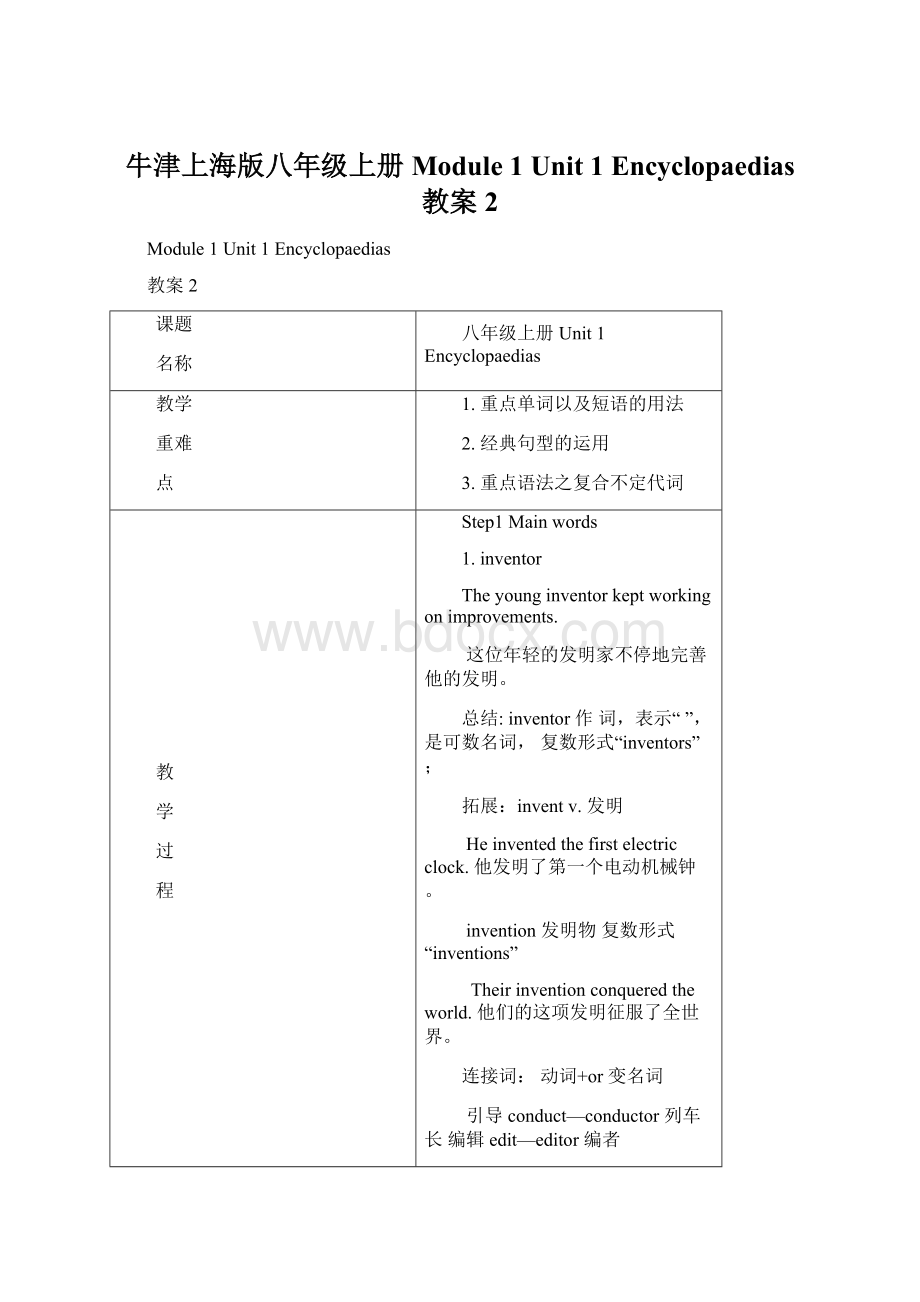牛津上海版八年级上册Module 1 Unit 1 Encyclopaedias 教案2.docx
《牛津上海版八年级上册Module 1 Unit 1 Encyclopaedias 教案2.docx》由会员分享,可在线阅读,更多相关《牛津上海版八年级上册Module 1 Unit 1 Encyclopaedias 教案2.docx(16页珍藏版)》请在冰豆网上搜索。

牛津上海版八年级上册Module1Unit1Encyclopaedias教案2
Module1Unit1Encyclopaedias
教案2
课题
名称
八年级上册Unit1Encyclopaedias
教学
重难
点
1.重点单词以及短语的用法
2.经典句型的运用
3.重点语法之复合不定代词
教
学
过
程
Step1Mainwords
1.inventor
Theyounginventorkeptworkingonimprovements.
这位年轻的发明家不停地完善他的发明。
总结:
inventor作词,表示“”,是可数名词,复数形式“inventors”;
拓展:
inventv.发明
Heinventedthefirstelectricclock.他发明了第一个电动机械钟。
invention发明物复数形式“inventions”
Theirinventionconqueredtheworld.他们的这项发明征服了全世界。
连接词:
动词+or变名词
引导conduct—conductor列车长编辑edit—editor编者
跟踪tail—tailor裁缝参观visit—visitor访问者
发觉detect—detector探测器传染infect—infector传染者
驾驶sail—sailor水手演act—actor演员
运用:
第二个重要的发明发生在美国。
我们拥有所有的思想并发明创造每种东西。
2.musician
Hewasabrilliantmusician.他是一位才华横溢的音乐家。
总结:
musician用作名词时,意思是“”。
连接词汇:
以ian结尾的名词
library(图书馆)—librarian(图书管理员)history(历史)—historian(历史学家)
Arab(阿拉伯)—Arabian(阿拉伯人)Christ(基督)—Christian(基督徒)
运用:
我长大后想成为一名音乐家。
3.scientist
Everyscientisthasachildhooddream.每位科学家都有一个童年的梦想。
总结:
scientist用作名词时,意思是“”。
science用作名词,意思是“科学”。
连接词汇:
以ist结尾的名词
ideal(理想)—idealist(理想主义者)art(艺术)—artist(艺术家)
violin(小提琴)—violinist(小提琴家)piano(钢琴)—pianist(钢琴家)
运用:
.你想成为一名科学家吗?
4.born
Somepeoplearebornbrainy.有些人天生聪明。
Jackwasabornteacher.杰克天生是个当老师的料。
总结:
dream用作动词时,意为“出生”;用作形容词时,意为“天生的”。
常用短语:
sb.beborn
运用:
他出生在美国。
她天生就是个钢琴家。
5.intelligence
She'sawomanofexceptionalintelligence.她是个有着非凡智慧的女子。
总结:
intelligence用作名词时,意思是“”。
拓展:
intelligent聪明的beof(much)intelligence=be(very)intelligent
运用:
她是个美丽又聪明的女人。
6.ability
Ithinkshehastheabilitytosolvetheproblem.我相信她有这个能力解决这个难题。
总结:
ability作名词,意思为“________”。
拓展:
able作形容词,意为“有能力的,能够的”
固定短语:
beabletodosth.=havetheabilitytodosth.
运用:
他有能力当一个好班长(monitor)。
7.perhaps
Perhapslovecanchangeeverything.或许爱能改变一切。
总结:
perhaps作副词,意思为“________”。
辨析:
probably,perhaps,maybe,possibly的区别
probably
“很有可能;十之八九”,其语义较强,可能性较大
It will probably be fine tomorrow.
明天大概会是晴天。
perhaps
“或许”,含有“可能这样,也可能不这样”
Perhaps we will be late for work.
或许我们上班会迟到。
maybe
“或许”、“大概”多用于美国英语,主要用于非正式场合,口语中常用
Maybehewillsucceed.
他也许会成功。
possibly
“或许;也许”,所指的可能性较小,为加强语气,可与can、could或may连用
It may possibly be true.
也许是真的。
8.include
AgoodBritishbreakfastalwaysincludessausages.一顿丰盛的英式早餐总会包括香肠。
总结:
include作动词,意思为“_______”。
拓展:
including和included用法区别
including被用作介词,后接名词构成介词短语
Thereare40studentsintheclassroom,includingme.
included也有介词用法,且:
including+宾语=宾语+included.
Thereare40studentsintheclassroom,meincluded.
运用:
所有的学生包括老师在内都要参加这次会议。
这家旅店的房价包括早餐。
9.however
However,somedinosaurslikedtoeatmeat.然而,有些恐龙喜欢吃肉。
总结:
however作副词,意思为“”。
可位于句前,句中和句后。
Sheisill,however,shegoestowork.
Hethinkit’sright.Heiswrong,however.
辨析:
however和but
however
“然而”,转折的意味较弱
可位于句前,句中和句后
后面常用逗号隔开
Helikesmusic.However,hiswifedoesn’t.
but
“但是”转折的意味很强烈
位于分句句首
后面不使用逗号
Helikesmusic,buthiswifedoesn’t.
10.win
Wecanwinthechampionship.我们有能力赢得冠军。
总结:
win作动词,意思为“”。
辨析:
defeat、beat和 win 的区别
defeat和beat属一组同义词,它们的宾语必须是人或一个集体
如a team,a class,a school,an army。
defeat尤指在战场上打败敌人;beat是游戏、比赛的专门用词。
二者常可换。
win表示在较强的竞争中取得胜利,它常跟的宾语有game, war, prize, fame, battle等。
运用:
他们取得了这次战斗(battle)的胜利。
一班打败了二班,获得了第一名。
Step2Mainphrases
1.beborn出生2.inthecountryside在农村
3.forexample例如4.morethan超过
5.humanbeing人类6.dieout灭绝
7.comeoutof从......出来8.attheendof在......末尾
9.justlike正如10.befamousfor以......闻名
11.goforawalk去散步12.findout了解,弄清
13.nextto紧挨着14.looklike看起来像
同步练习:
根据句意从左面选择适当的短语并用其正确形式填空,补全句子。
1.Ifwedon’tprotecttheenvironment,alltheanimalswill______________.
2.Mygrandparentslive.
3.WhenMum_________________thehouse,shesawabigdoginfrontofthedoor.
4.Sheisveryintelligent,_________________shecanspeakfourlanguages.
5.Hangzhouthesilk.
6._________________theterm,Jimdidwellinthefinalexam.
7.Let’s_________________afterdinner.
8.Thereare_________________50studentsinourclass.
9.Thepolicethetruthofthemurder(谋杀).
10.I’minterestedinpeople.
11.--Whereyou?
--InEngland.
12.--Whatyourfriend?
--Tallandthin.
13.Everyonelikesacleanclassroom,home.
14.Thereisastoreourschool.
Step3Mainsentences
1.Lookitup!
查阅一下!
解析:
lookup意为“查阅,查询”强调在词典、参考书里查询
Wecanlookupnewwordsinthedictionary.我们可以在词典里查新单词。
拓展:
lookup仰视,向上看
HelookedupfromhisbookwhenIcameintotheroom.
我进入房间时,他从书本上抬起头来看了看。
相关短语:
lookaround向周围看lookout小心looklike看起来像
lookthesame看起来相同lookforwardto盼望
运用:
1.ThismorningIsomenewrestaurantontheInternetforIwantedtotakeMiatoanicerestaurantforherbirthday.
A.pickedupB.lookedupC.cleanedupD.gaveup
2.过马路时要小心!
3.我盼望去美国旅游。
2.Somedinosaurswereassmallaschickens.有些恐龙和鸡一样小。
解析as.....as....和.....一样......中间接形容词或副词的原级
否定:
notas/so......as............不如......
Thistreeisastallasthatone.这棵树和那棵树一样高。
Thistreeisnotso/astallasthatone.这棵树不如那棵树高。
运用:
--Englishisn’tasasChinese.
--Maybe,perhapsit’sjustbecauseChineseisyournativelanguage.
A.easyB.easilyC.easierD.easiest
3.Comesoutofhis/hermother’sbody从他/她妈妈的身体里出来
解析:
outof从.....出来,在.....外
Thestudentscomeoutoftheclassroom.学生从教室里传来。
拓展:
常见的outof相关短语
rushoutof
从…冲出来
jumpoutof
从...跳出来
lookoutof
从...向外看
takeoutof
从...取出来
运用:
那只可爱的小猫从箱子里跳了出来。
Ann生气地从房间里冲了出来。
同学们,请把书从书包里拿出来。
4.Theyhelpedmethinkanddream.它们帮助我思考和梦想。
解析:
helpsb.(to)dosth.helpsb.withsth.帮助某人某事
HeoftenhelpsmetostudyEnglish.=HeoftenhelpsmewithEnglish.
拓展:
1)helponeselfto随便吃
Helpyourselvestosomefish,children.孩子们,随便吃点鱼吧。
2)can’thelpdoingsth.禁不住做某事
Shecan’thelplaughing.她禁不住笑了。
运用:
你会帮妈妈做家务吗?
他太累了,禁不住睡着了。
Step4Grammar复合不定代词
1)复合不定代词的构成
复合不定代词由some,any,no,,every加上-body,-thing,,-one构成。
somebody某人anybody任何人nobody没人everybody每人
someone某人anyone任何人noone没人everyone每人
something某物anything任何事物nothing没东西everything每件事
2)复合不定代词的用法
这些复合不定代词只具有名词性质,用作单数,在句中可用作主语、宾语和表语。
带some的一般用于肯定句,而带any的一般用于否定句和疑问句;它们的用法同some,any的用法类似。
带body与带one的复合代词,其词义相同,只是带body的较口语化。
Everythingbeginstogrowinspring.春天万物开始生长了。
Somethingiswrongwithmywatch.我的手表坏了。
Ican’tseeanything.我什么也没看见。
3)复合不定代词的特殊用法
(1)用在表示“请求”、“建议”或希望得到对方肯定答复的疑问句中。
Wouldyoulikesomethingtodrink?
你想喝点什么吗?
(2)复合不定代词被定语所修饰时,定语必须放在它的后面。
Thereissomethingwrongwiththeradio.收音机出了毛病。
4)复合不定代词的属格
1.含-one和-body等指人的复合代词可有’s属格形式。
Everybody’s business is nobody’s business.大家的事情没人管。
Is this anybody’s seat?
这儿有人坐吗?
2.含-one和-body等指人的复合代词后跟else时,’s属格应加在else之后。
Can you remember someone else’s name?
你还记得其他人的姓名吗?
3.含-thing等指事物的复合不定代词没有’s属格形式。
5)复合不定代词的否定
1.“not every-”表示的是部分否定,意为“并非都,不都”。
Not everything will go well. 并非一切都会那么顺利。
The teacher didn’t call everyone’s name. 老师并没有点所有人的名。
2.“not any-”和no-均表示全否定。
He listened, but heard nothing.他听了听,但什么也没听到。
= He listened, but didn’t hear anything.
You haven’t called anyone/anybody up, have you?
你没给谁打过电话,是吗?
= You have called no one/nobody up, have you?
6)合与分的区别问题
1.someone,anyone,everyone都只能指人,且不和介词of连用;
some one,any one,every one则既可指人又可指物,可与介词of连用。
Anyone should be polite to every one of them.
任何人都要礼貌对待他们中的每一个人。
---Which toy would you like?
---Any one is OK. ---你要那个玩具?
---随便。
2.no one(=nobody)“没有人”,只用来指人,通常不和介词of连用;none“没有一个”,
既可以用来指人也可用来指物。
例如:
No one can do it better. 没有人能做得更好。
None of these questions is easy, and none of us can even answer any one of them.
这些问题没有一个是容易的,我们中没有一个人能答出其中的一题。
回答who引导的特殊疑问句时用no one;回答how many引导的特殊疑问句时用none。
---Who was late?
---No one. ---谁迟到了?
---谁也没有迟到。
---How many pigs do you keep?
---None. ---你养几头猪?
---一头也没养。
同步练习:
( ) 1. I’m hungry. I want ______ to eat.
A. anything B. something C. everything D. nothing
( ) 2. —Do you have ______ to say for yourself?
—No, I have ______ to say.
A. something; everything B. nothing; something
C. everything; anything D. anything; nothing
( ) 3. Why not ask ______ to help you?
A. everyone B. someone C. anyone D. none
( ) 4. Everything ______ ready. We can start now.
A. are B. is C. be D. were
( ) 5. There’s ______ with his eyes. He’s OK.
A. anything wrong B. wrong something
C. nothing wrong D. wrong nothing
( ) 6. —The story is so amazing!
It’s the most interesting story I’ve ever read.
—But I’m afraid it won’t be liked by ______.
A. everybody B. somebody C. anybody D. nobody
( ) 7. She listened carefully, but heard ______.
A. anyone B. someone C. everyone D. nothing
( ) 8. I agree with most of what you said, but I don’t agree with ______.
A.everything B. anything C. something D. nothing
( ) 9. —Everyone is here today, ______?
—No, Han Mei isn’t here. She’s ill.
A. isn’t it B. isn’t he C. are they D. isn’t everyone
( ) 10. Everything goes well, ______?
A. is it B. isn’t it C. do they D. doesn’t it
课后小结
上课情况:
课后需再巩固的内容:
配合需求:
家长_________________________________
学生_________________________________